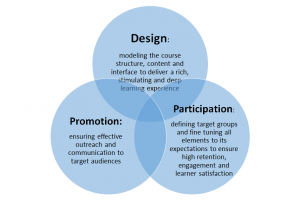Boot Camp for Future Business MOOC Makers
- If you are from university: You’ve got a great course at your university that you want to transform into a MOOC? You need to start from scratch and create a successful MOOC? You’ve delivered many courses to students but now you want/need to address a more business/professional audience?

- If you are from business: Everyone is talking MOOCs, but how exactly do they work and how can you integrate them in your Human Resource Development programme? Can you transform your own training approach or better team up with higher education institutions and design a joint offer?
If you search for answers to the questions above, join our workshop at EMOOCs2019 conference in Naples from 20.-22.5.2019. Here is an outline what to expect:
1. Objective, Topic, Content, and Themes
MOOCs have arrived to workplace training. They are increasingly attracting interest of organizations and individuals that seek to develop labor-market relevant skills. More and more of these make efforts to become recognized not only as MOOC learners, but also MOOC creators. However, the awareness level with MOOC as contemporary training format beyond both academia and business is still low compared to the US.
This hands-on workshop is dedicated to participants who wish to exploit an existing shortcut to creating successful business MOOCs. With the help of the MOOC BOOK, an open resource platform, the participants will work in teams to design a (or transform an existing) MOOC attractive to business audiences that they come up with. They will be guided through this process by four trainers and the MOOC BOOK showcasing recommendations, good practice and up to date know-how which has been elaborated in a sequential mixed-methods approach consisting of 55 expert interviews, six surveys, 14 focus groups and three MOOC Pilots. Thus, the objectives of the workshop are to introduce future MOOC makers to different opportunities and approaches to open up their educational offer to business audiences and cater them with an action plan.
The workshop is designed as a mini-hackathon, where 4 teams will be working on their own ideas for a MOOC based on the PDP (Promotion/Design/Participation) framework.
- Promotion: ensuring effective outreach and communication to target audiences
- Design: modeling the course structure, content and interface to deliver a rich, stimulating and deep learning experience
- Participation: defining target groups and fine tuning all elements to its expectations to ensure high retention, engagement and learner satisfaction
Working within these three critical and interconnected areas, participants will learn how to adapt their own existing materials, such as an academic course, e-learning course or corporate training program and transforming them into a business MOOC, fitted to the needs and expectations of contemporary professionals.

Fig. 1. PDP (Promotion/Design/Participation) Framework. Source: own work.
The workshop elaborates in the intersection of academia and business and is an effort to contribute to the further development of an European approach in the US-dominated business MOOC market, tackle the certification challenge and support European higher education institutions to stay in the game by providing the academic foundation and didactical expertise in the technological revolution.
2. Workshop Format and Duration
The workshop is designed in two parts, allowing participants for a flexible participation.
Part I (fast track; 90 min.)
- Introduction by workshop facilitators (15 min.): 4 introductory LIGHTNING TALKs and presentation of the MOOC BOOK
- Interactive hands-on part (75 min. in total):
- Idea generation in teams (20 min. incl. team formation)
- Sprint design in teams with coaching provided by trainers (20 min.)
- Presentation of MOOC projects (20 min.)
- Selection of winning team and outlook to full track (15 min.)
END of fast track
Part II (full track; 90 min.)
- Further insights into designing MOOCs for business
- Work in teams – developing the winning project (45 min.)
- Presentations (15 min.)
- Discussion (15 min.)
- Recap, reflection and outtakes (15 min.)
END of full track
Thus, the duration of the workshop is 1,5 hours for the fast track and 3 hours for the full track. Participants can register for the fast track which will be a concise, speedy and challenging sprint-like exercise in MOOC design, or stay for the full track which will enable the participants to gain a deeper experience in creating MOOCs for business by working out the critical elements of the winning project of the fast track. The selection of the winning team in the fast track will be done with the whole group (group assessment, 5 points each) along the criteria “idea, potential, design and presentation”.
3. Targeted attendance
The course intends to attract both academia and business representatives and bring them together to develop solutions. The workshop registration will open soon and invites all interested registered parties, but will be limited to 20 participants (with an optional waiting list).
4. Biographies of Trainers
- Christian Friedl is Senior Lecturer at the Institute of International Management at FH JOANNEUM – University of Applied Sciences in Graz, Austria. His research focuses on entrepreneurship, university-business corporation and new ways of delivering education. He is project leader of the Global Entrepreneurship Monitor Austria and coordinator of several EU-wide research projects such as BizMOOC – MOOCs for the world of business, CORSHIP – Corporate Edupreneurship or KTU –Knowledge Transfer Units. Besides, he is also developer of business MOOCs and has co-authored the MOOC BOOK. He is Graduated Adult Educator (wba austria) and Finalist of the 4th ECEI Teaching Innovation Excellence Award 2018. Before, he was employed as Educational Manager at the University of Graz for eight years and brings in vast experience in designing and moderating workshops.
- Thomas Neumann is an experienced Project Manager at AVL List GmbH with a demonstrated history of working in the automotive industry. Thomas’ fields of expertise are e-learning, open innovation, non-/informal learning and workplace learning. He is skilled in HR-D, Sales, Educational Consulting, Adobe eLearning Suite, and Management. He has participated in various European projects such as the BizMOOC Project. He has a Master of Arts (M.A.) focused in Intercultural/Multicultural and Diversity Studies from Universität Salzburg.
- Thomas Staubitz is research associate at the Hasso Plattner Institute (HPI) and core member of the HPI’s MOOC platform team, which is responsible for the development, maintenance and operation of the MOOC platforms openHPI, openSAP, mooc.house and OpenWHO. His research focus is on collaborative work and assessment beyond multiple choice quizzes in scalable e-learning environments. He has co-authored and facilitated several MOOCs on the openHPI and openSAP MOOC platforms, e.g.: https://open.hpi.de/courses/javaeinstieg2017 or https://open.sap.com/courses/java1
- Dr Agnes Zur is an assistant professor at the Department of Entrepreneurship and Innovation at Cracow University of Economics CUE. She is deeply passionate about innovative education and has rich experience as an educator with BA, MA, MBA and PhD students. Author of publications on corporate entrepreneurship, social entrepreneurship and higher education teaching and learning. As certified trainer and academic tutor since 2013 she has been the Coordinator of an honours program at CUE, an innovative educational approach based on tutoring and individual and personal relationship with students. She is also the supervisor of Executive MBA program at CUE. She is the co-author of an award winning Massive Open Online Course on Intrapreneurship.
